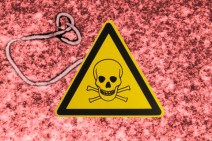
The overwhelming majority of the public that denies either Ebola or Climate Change cannot check the facts. Exciting conspiracy theory’s and reference to real and imagined evils can call into question any fact. This reason for doubt is not proof of falsehood as it is often treated. Example:
“I do not believe Ebola exists because none of my family members has been affected by it,” she says. “When you get sick of cholera, they say it is Ebola. When your body temperature rises, they say it is Ebola. So I honestly don’t believe Ebola exists. There could be a lot of other diseases killing people.”
Source: NPR.Org Skeptics In Sierra Leone Doubt Ebola Virus Exists by Ofeibea Quist-Arcton
The argument of this African woman reminds me of a conservative pointing to a cold snap and denying climate change.
The ability to explain what we see in words is not hard. Germ Theory and Evil Spirits both explain a spreading infection but one is more fact based and leads to better predictions and prognosis. Now let us look at an apologist for climate change denial from the popular Brietbart.Com.
“…if the climate establishment took the time to listen to what he had to say – especially on satellite data versus computer models – instead of just dreaming up emotive analogies to explain why he’s wrong maybe it might actually learn something.”
Sourse: Brietbart.Com – Climate Change Denial: Like Sending a Little Girl to Near-Certain Death… By James Delingpole
Ironically an article at Brietbart.Com calls attention to the denial of Ebola. I wonder if they are taking the side of the prevailing wisdom that Ebola is real. If so, would they drop that opinion if someone with credentials also denied the dread disease? What would be their standard for evidence?
When considering evidence and reasons we should envision a scale with competing explanations. At any moment in time the thesis that explains the most facts in a consistent way and leads to better predictions will be provisionally superior. Of course, a new fact might tip the scale. The Conservative begging for authority that simply looks at credentials instead of weighing facts, reason and a more accurate power to predict outcomes pits professionals against professionals who can both site facts, but which facts are relevant? At any one point in time one side may have more logical content and evidence on its side and that has nothing to do with credentials or the respect of the masses or anyone’s desires. Once one explaination establishes itself as being more creditable based on content not credentials, that becomes the working hypothesis until better comes along.
I have little reason to doubt the fact that the woman who says nobody in her family died from Ebola is telling the truth. She may even be a very respected in her community. But is the fact about the family weighty enough to believe that Ebola is not real? No! Some people never got smallpox but that is not evidence that the disease does not exist. We may have a cold snap but that is not evidence that the countless metric tons of carbon we pump into the atmosphere every day has no impact on the climate. The fact that we, the general public and politicians cannot confirm the relevant facts ourselves is no argument in favor of a conclusion we prefer. This includes the deniers of Ebola and climate change. Erring on the side of caution while we resolve our doubts seems like a conservative idea to me. After all, it involves conservation and maintaining what is good about what we already have.
 Originally published at Elephant Journal By Todd Vickers
Originally published at Elephant Journal By Todd Vickers





